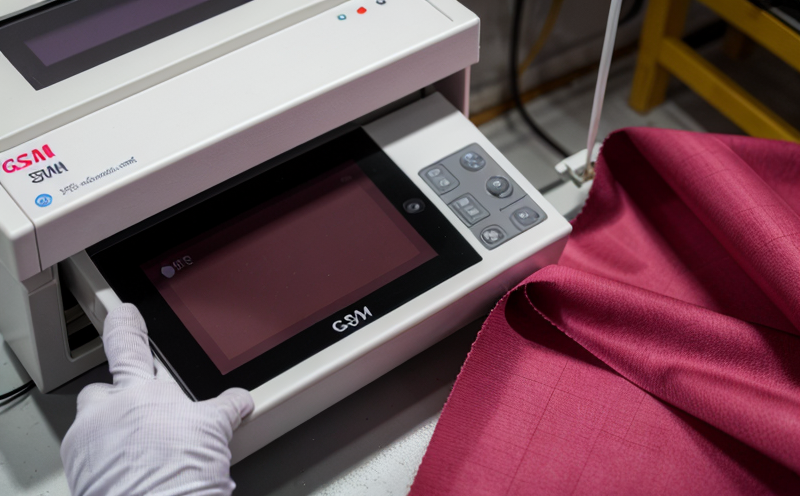ISO 9073-3 Textiles Nonwovens Tensile Strength Testing
The ISO 9073 series of standards is widely recognized for its role in providing uniform methods for the mechanical testing of textiles. Specifically, ISO 9073-3 focuses on tensile strength tests for nonwoven fabrics. This service plays a crucial role in ensuring that fabricated materials meet strict quality control and regulatory requirements across various industries such as medical, automotive, and consumer goods.
Nonwovens are versatile materials used in a wide array of applications due to their unique properties. They can be composed of synthetic fibers or natural fibers, and they offer advantages like lightweight, breathability, and durability. The tensile strength test is essential for assessing the integrity and performance of these materials under stress conditions.
The testing process involves subjecting a sample to controlled stretching until it breaks. This method measures how much force can be applied before failure occurs, which provides critical insights into material quality. By conducting this test according to ISO 9073-3 guidelines, we ensure consistent and reliable results that are comparable across different laboratories.
Our state-of-the-art equipment allows us to perform these tests accurately and efficiently. We employ advanced sensors and software systems to monitor every aspect of the testing process, ensuring precise measurements down to millimeter increments. Our experienced technicians follow rigorous protocols to prepare samples correctly before placing them into our test fixtures.
The results obtained from this type of testing are vital for several reasons:
- Identifying weaknesses in design or manufacturing processes
- Evaluating the effectiveness of new materials and formulations
- Complying with international standards for product safety and performance
- Supporting R&D efforts aimed at improving material properties
In addition to providing accurate data, we also offer comprehensive reports that include detailed descriptions of the testing procedures used along with visual aids like graphs and charts. These documents serve as valuable resources for quality assurance teams responsible for maintaining high standards within their organizations.
By leveraging our expertise in textile testing services based on ISO 9073-3, clients can gain confidence knowing that they are receiving consistent, reliable data from a trusted partner committed to excellence. Whether you're looking to enhance your product offerings or ensure compliance with regulatory requirements, our services will help meet those goals effectively.
Applied Standards
The application of ISO 9073-3 for tensile strength testing on nonwovens is primarily applicable within the textile manufacturing industry. This standard ensures that manufacturers can produce consistent and high-quality products by providing clear instructions on how to perform these mechanical tests.
When conducting this type of test, it's important to adhere strictly to specified parameters outlined in ISO 9073-3. These include selecting appropriate sample sizes, ensuring proper mounting techniques during the test process, and using calibrated equipment capable of measuring force accurately up to several thousands of newtons.
The standard also specifies acceptance criteria which must be met for a given material type or grade to pass inspection. For example, if you're testing medical gowns made from polyethylene nonwovens, the tensile strength required might vary depending on specific use cases (e.g., surgical vs. general care). Compliance with these standards helps ensure that products meet both internal quality control objectives as well as external regulatory requirements.
Competitive Advantage and Market Impact
- Accurate data provides a competitive edge when bidding on contracts requiring compliance with specific mechanical property standards.
- Prompt turnaround times enable businesses to respond swiftly to market demands or changes in regulations.
- Consistent results across multiple samples allow for better process control and optimization, leading to cost savings through reduced waste.
In today's competitive global market, having access to precise information about the mechanical properties of your materials can make all the difference. By offering ISO 9073-3 compliant tensile strength testing services, we help our clients stay ahead of their competitors by ensuring they have accurate and reliable data at their fingertips.
Furthermore, adherence to international standards like ISO 9073-3 enhances credibility within the industry. It demonstrates a commitment to quality and reliability that can attract new customers and strengthen relationships with existing ones. In an era where trust is paramount, being able to demonstrate compliance with widely recognized standards becomes increasingly important.
Use Cases and Application Examples
- Tensile strength testing of surgical gowns made from polyethylene nonwovens to ensure they meet stringent requirements for durability and tear resistance.
- Evaluating the performance of geotextiles used in civil engineering projects by assessing their ability to withstand loads without tearing or breaking.
These examples illustrate just a few ways that tensile strength testing can benefit different sectors within the textile industry. However, the applications are not limited to these areas; virtually any product requiring assessment of its mechanical properties could benefit from this type of testing.





